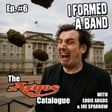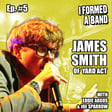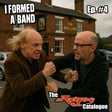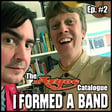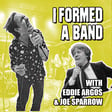
Dunstan Bruce formed a band! Chumbawamba, anarchy, and accidentally writing a global super-hit
Ep. 3: Eddie and Joe chat to the funny, erudite and extremely dapper Dunstan Bruce – he of 90s Tubthumping BEHEMOTH Chumbawamba, and, latterly, Interrobang. This was a great interview: Dunstan has so much thoughtful stuff to say about life, music fandom, art, anarchy, pranks, learning, growing – and selling millions of records well over a dozen years into your career.
Eddie came away from the interview with a renewed love for Chumbawamba, and Joe, who pretty much only listened to Suede in the 90s, came away with huge admiration for them and their music. (Both Eddie and Joe especially loved the band’s deep-cut “Mouth Full of Shit”, although that didn’t stop them repeatedly getting the name wrong when discussing it at the end of the podcast.)
Dunstan's story is also about trial, error, long-winded conversations with band-mates, tricking journalists into saying rude things bout them, maybe-accidentally writing a enormous global hit, and how it felt like their “breakthrough moment” was many years before “Tumbthumping” when the band finally stopped sleeping in their van and got a sleeper coach on tour.
(Joe also accidentally compares Dunstan to Kier Starmer, and is sincerely sorry, Dunstan.)
And we got to meet Dunstan’s cat right at the end, too!
Plus, in a bonus Argos Catalogue section, Eddie explains how he was once in a lift with Mark E Smith AND one of the Wu Tang Clan... but how many members of the Wu-Tang has Eddie actually met?
Chumbawamba’s excellent “I Get Knocked Down” documentary https://www.youtube.com/watch?v=dsAVHNPpUtQ
Wikipedia: https://en.wikipedia.org/wiki/Chumbawamba
Dunstan: https://www.instagram.com/dunstanbruce/
Interrobang: http://interrobangband.co.uk
